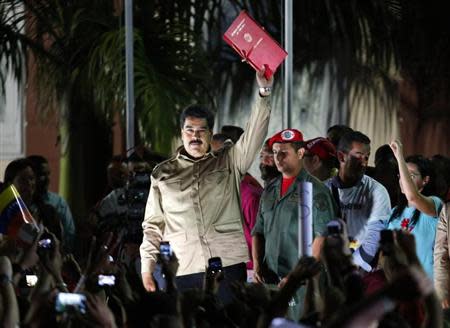Fire sale TVs and Chavez-style theatrics heat up Venezuela vote

By Brian Ellsworth and Eyanir Chinea CARACAS (Reuters) - Venezuelan President Nicolas Maduro is firing up supporters for the upcoming mayors' election through a theatrical confrontation with businesses that has showered voters with cheap consumer goods, echoing the style of late socialist leader Hugo Chavez. The December 8 vote for control of 335 municipalities, ranging from urban hillside slums to isolated villages in sweltering plains, will be the first major test of Maduro's strength after he narrowly won the presidency in April. Venezuelans are flooding shops to snatch up discounted car parts, televisions and clothes since Maduro ordered businesses to slash prices in a gambit similar to the oil-financed pre-election largesse of the Chavez era, but with private merchants footing the bill. "These are the right measures. The shop owners themselves voluntarily lowered prices, which means they are recognizing the products were overpriced," said Leonardo Jimenez, a 28-year-old lawyer, in line outside a shop at a prominent Caracas mall. "This is obviously going to have a positive impact on the upcoming elections." Pitting working-class consumers against business leaders in the run-up to the vote could help rally Socialist Party sympathizers weary of nagging product shortages and surging inflation that is approaching 55 percent. Flashy videos on state TV showed ministers denouncing over-pricing by retail chains to a backdrop of thumping dance music, and interviews with shoppers thanking Maduro for protecting them from rapacious capitalists. People continued to line up at shops around the country even as inventories dwindle and shelves are increasingly bare. National Guard troops bearing assault rifles and bored expressions keep watch to prevent a repeat of several instances of looting that took place shortly after Maduro's order. One woman rose to prominence thanks to a photo showing her emerging from a shop with new electronics and a joyful smile. Assuming she had stolen the goods, opposition commentators dubbed her "The Looter." The woman, Clotilde Palomino, responded by producing receipts to show she had paid for the goods. Maduro invited her to the presidential palace and cited her as an example of humble Venezuelans who benefited from the measures. The ruling Socialist Party is likely to proclaim victory if it wins the majority of mayors' seats, but pollsters say that is probable anyway because most municipalities are sparsely populated pro-government areas. The opposition looks likely to win key metropolitan areas including the capital Caracas and second city, Maracaibo, according to a confidential presentation by one pollster. Many high-profile pollsters no longer publish their surveys given the furious controversy they create, though they are frequently leaked to private media. 'DON'T LEAVE ME WITH NOTHING!' Maduro's "economic offensive" began with the military occupation of an electronics chain and has since included aggressive inspections of thousands of businesses. Critics call it an act of government-organized looting and say it has punished honest entrepreneurs by forcing them to sell below cost. They predict it will pave the way for more product shortages down the road. One widely circulated online video shows an electronics merchant shouting, between sobs, that forcing him to mark down his merchandise would ruin him. "For the love of God, this is an offense. Don't leave me with nothing!" the man yelled, moments before officials and troops led him away. Election campaigning officially kicked off on Saturday, but received scant attention amid the rush for cheap goods and Venezuelans' general weariness with marches, speeches and rallies after three elections in just over a year. Mayors are a crucial component of national politics in Venezuela because they receive a considerable portion of the country's oil wealth from the central government. They are also among the only politicians who can reach the poor in rural areas such as the sparsely populated jungle-like expanses of the southeastern Bolivar state and the isolated plains of Barinas state where Chavez grew up. The opposition casts the vote as a plebiscite on Maduro's governance and his efforts to maintain the state-driven economic model advanced by Chavez, who died of cancer in March. Opposition leader Henrique Capriles hopes anti-government candidates will win an overall majority of votes, providing a symbolic victory. Some pollsters predict a strong showing for the ruling party would let Maduro enact unpopular reforms such as a liberalization of exchange controls that could help ease shortages but may be seen by supporters as a betrayal of Chavez's legacy. Investors are expecting a sharp devaluation in January, less than a year after the last one, and the creation of a new parallel currency exchange market to ease product shortages. Even Venezuelans who question Maduro's strategy are taking advantage of bargains, in part because they worry products will not be available in the future. "I'm not very convinced this is going to work," said Mauricio Garcia, 25, in line at a sporting goods store. He noted that big shops have closed in the electronics-focused shopping center where he works selling cell phone parts. "Maduro launched this just in time for the elections." (Reporting by Brian Ellsworth; Editing by Daniel Wallis and Vicki Allen)
